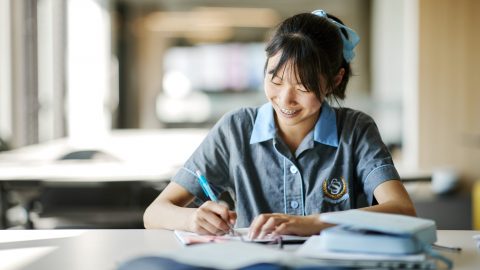Principal Update – A Change of Pace

It is difficult to believe that with our students now happily settled on campus and ensconced back in classrooms, they will soon commence the somewhat frenetic preparation for the end of year assessment period. Following this unusual school year, I have encouraged all students to endeavour to create a change of pace and strategy with their approach to the forthcoming exam study.
Whilst, more so than ever before, we have been heavily reliant on technology, it may seem almost absurd that our girls need to now pick up a pen and hand write for two – three hours in one block of time. The need also arises for students to re-learn to concentrate for this length of time as well with distractions of family dogs, mobile phones and siblings – the list is endless.
In modern times, technology has advanced to the point where it is accessible by all and irresistible for a teen to survive without it. Recent data from iKeepSafe suggest educators and parents have a right to be concerned, with 28% of teens reporting that their digital engagement interferes with school work. Adults are hardly exempt (myself included) with 14% of adults acknowledging that they need to spend less time with multiple devices functioning; noting, this is pre-COVID research!
Multitasking isn’t a problem if a student wants to be on Instragram while watching television, or listening to music while playing a video game. But when students are undertaking serious exam study, they have to have focus. Texting, e-mailing, and posting on social media are mentally complex, drawing on the same brain resources (like using language and discerning meaning) as schoolwork.
The mental work of toggling back and forth from school work to social media is where students risk sacrificing their best abilities. It seems like only a few seconds of interruption, yet it takes us a while to re-engage and shift back into the flow. This ‘dislocation’ is problematic as we may become fatigued from the effort of repeatedly bringing our minds back to a task. Thus, one hour of homework can take two or three hours, and be more exhausting—but the effort is not from the work itself, but the work of constantly re-focusing. Some interesting research in this area reveals:
- Assignments take longer to complete because of the time taken up with distractions and the time it takes to refocus after an interruption.
- There’s more mental fatigue from repeatedly dropping and picking up mental threads, which leads to more mistakes. Task-switching is especially tiring when students move between formal, precise language tasks and informal, colloquial banter.
- Learning is patchier and shallower.
- Students remember less well. The moment of encoding is what matters most for retention with many laboratory studies having demonstrated that when our attention is divided during encoding, we remember that piece of information less well – or not at all.
- Students have greater difficulty understanding information and transferring learning to new contexts.
For this year, in particular, much of young people’s technology use has increased by the sheer need to connect with friends whilst in lockdown. Many parents have commented on their easing of the household rules as girls could only rely on their phones to connect socially. Constant texting, however, qualifies as compulsive behaviour that now requires re-management for students to be able to learn and perform at their best academically.
The most significant challenge is that students don’t believe this is a problem. Many young people think they can perform two challenging tasks at once, but this is not the case. As challenging as this may present, I encourage parents to re-draw some firm lines on technology being used whilst studying for exams, as this is a time when concentrating on just one thing is important.


